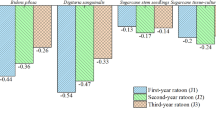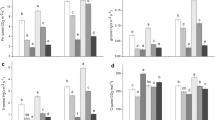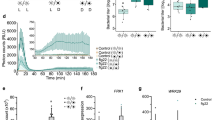Abstract
Rees and Skelding1 have reported that extracts of red beet root tissue inhibit the absorption of salts by this material. They claimed that the extracts do not affect respiration, and attributed the influence to a non-metabolic effect on permeability. It was suggested that the inhibitory principle is responsible for natural dormancy in beet roots, and for the inability of freshly cut disks of dormant tissue to absorb salts actively. In an intensive investigation of this problem during the past two years, we have confirmed the main inhibitory effect, and have suggested a probable cause. It is hoped that a full account of the work will be published elsewhere.
This is a preview of subscription content, access via your institution
Access options
Subscribe to this journal
Receive 51 print issues and online access
$199.00 per year
only $3.90 per issue
Buy this article
- Purchase on Springer Link
- Instant access to full article PDF
Prices may be subject to local taxes which are calculated during checkout
Similar content being viewed by others
References
Rees, W. J., and Skelding, A. D., Nature, 166, 823 (1950). Skelding, A. D., and Rees, W. J., Ann. Bot., N.S., 16, 513 (1952).
Sutcliffe, J. F., J. Exp. Bot., 3, 59 (1952).
Bennet-Clark, T. A., and Bexon, D., New Phytol., 42, 65 (1943).
Author information
Authors and Affiliations
Rights and permissions
About this article
Cite this article
DALE, J., SUTCLIFFE, J. Inhibition of Salt Absorption in Red Beet Root Tissue. Nature 177, 192–193 (1956). https://doi.org/10.1038/177192a0
Issue Date:
DOI: https://doi.org/10.1038/177192a0
This article is cited by
Comments
By submitting a comment you agree to abide by our Terms and Community Guidelines. If you find something abusive or that does not comply with our terms or guidelines please flag it as inappropriate.



